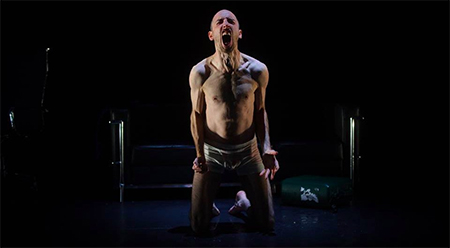 Writer and Director Mark Wilson uses William Shakespeare’s Hamlet as a departure point for his new work Anti-Hamlet. Those having certain tastes – say, some for contemporary Australian politics, and a lot for meta-theatricality – may find the piece particularly enjoyable.
Writer and Director Mark Wilson uses William Shakespeare’s Hamlet as a departure point for his new work Anti-Hamlet. Those having certain tastes – say, some for contemporary Australian politics, and a lot for meta-theatricality – may find the piece particularly enjoyable.
In a prologue, artist Hamlet (Wilson) informed us that he has a one-man show currently in rehearsal. He’s distracted by close university friend Ophelia (Natascha Flowers) recently returned from time as a Rhodes Scholar and intern with the EU and UNHCR. Suddenly we see Hamlet’s awkwardness at how little he has achieved in her absence. This set the scene for a very different slant on the prince’s tale.
Many characters from Hamlet are here, after a fashion, in the present day. Queen Gertrude (Natasha Herbert) mostly indulges her son’s choices and self-centredness. When annoyed though, she’s quick to throw insults like “professional student”.
Claudius (Marco Chiappi), originally usurper of his brother’s throne, is now Prime Minister. This incarnation too consorts with Gertrude. Modern Claudius seeks her accession to a referendum, opposed by Hamlet, aiming to end the Royal Family’s influence and make Claudius president.
Concerns gripping this Denmark’s political class will be familiar to a local audience; potential for Islamist terrorism, protecting borders from arrivals of boat people, and their offshore processing. Also recognisable is some resistance to such policies; Ophelia seeks to make asylum seeker treatment more humane by pursuing a government role.
Anti-Hamlet also gives us new characters. The father of psychoanalysis Sigmund Freud (Brian Lipson) is here to get to the bottom of why Prince Hamlet is so irritated by Gertrude’s interest in her Prime Ministers. Freud’s nephew Edward Bernays (Charles Purcell) is an information consultant insinuating himself into government.
Weaving his way through the various threads of the story, Horatio (Marcus McKenzie) is transformed from his Shakespearean role of Hamlet’s friend into a man who has a much more complicated relationship with the young prince.
Anti-Hamlet seeks to make a lot of social commentary. At times this seemed quite laboured. One example was a lengthy speech by Purcell on governments collecting information on their citizens. The punchline was obvious for those who follow the news, such as reporting of concerns over an extended period of data retention following the Australian Census.
Other matters to get a run included Terra nullius, black face, misogyny in power structures, and the tensions between capitalism and democracy. Hardly any would be excavated enough to give substantial insight.
The clutter of ideas also curtailed the time available to develop relationships, so we had to take leaps of faith. I particularly didn’t believe how quickly Ophelia compromised her principles when she appeared to gain nothing for such concessions.
The comedic aspects of Anti-Hamlet seemed to work better. Sections of the audience had good laughs at a raft of Melbourne-centric jokes against theatre-maker Hamlet and his superficial embrace of fringe causes and ideologies.
Amidst the lashings of meta-theatricality, Lipson amused with some droll one-liners. Herbert went for humour at the other extreme of delivery as her stresses as head of state were amplified by Hamlet’s impulsive actions. Ambitious Chiappi was convincing as a blokey opportunist. Through amusingly perverse exaggeration, his scenes with slippery and confident Purcell showed how government paranoia and reliance on surveillance could lead to the tail wagging the dog.
With his big facial expressions and rubber limbs, Wilson was particularly suited to the physical comedy used to break up the political machinations.
Those keen to see how key events in Hamlet would filter through Wilson’s consciousness might find some unexpected highlights. Replacing Polonius with Freud behind the arras got one of the biggest laughs of the night. Flowers showed us that there’s an even worse watery end than that which originally befell Ophelia.
Mackenzie was a satisfyingly disconcerting antagonist to Prince Hamlet. Of all of the play’s relationships, this one has the potential to connect more strongly with some of the themes raised. To achieve this though, Anti-Hamlet will need to make space by trimming redundancy.
Following a dispute, Bernays said to Hamlet “We could have another violent scene … but it’s already been a long enough night” – a line greeted with vigorous laughter. It’s funny because it’s real, especially in a too-warm theatre on not-so-comfortable seats. Sure, there are many issues to comment on in modern Australia, and many jokes to be made at the expense of the arty left. For Anti-Hamlet though, trying to cram so many of them into 100 minutes gave an anti-cohesive result.
Anti-Hamlet
Theatre Works, 14 Acland Street, St Kilda
Performance: Friday 4 November 2016 – 8.00pm
Season continues to 13 November 2016
Information and Bookings: www.theatreworks.org.au
Image: Mark Wilson in Anti-Hamlet – photo by Sarah Walker
Review: Jason Whyte
